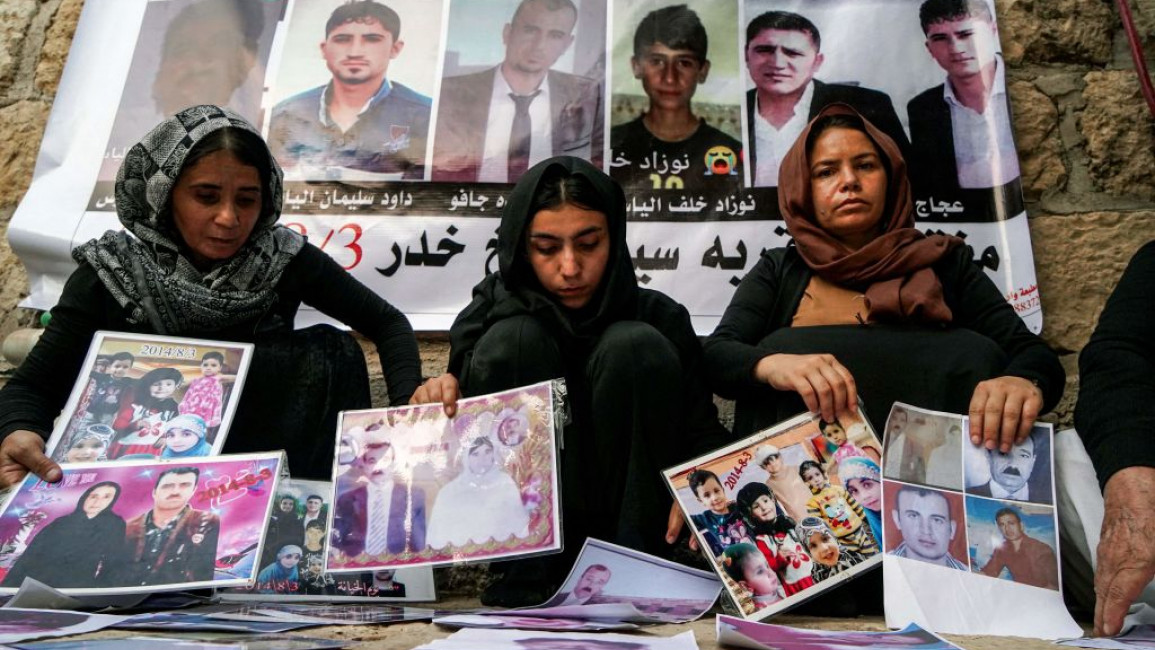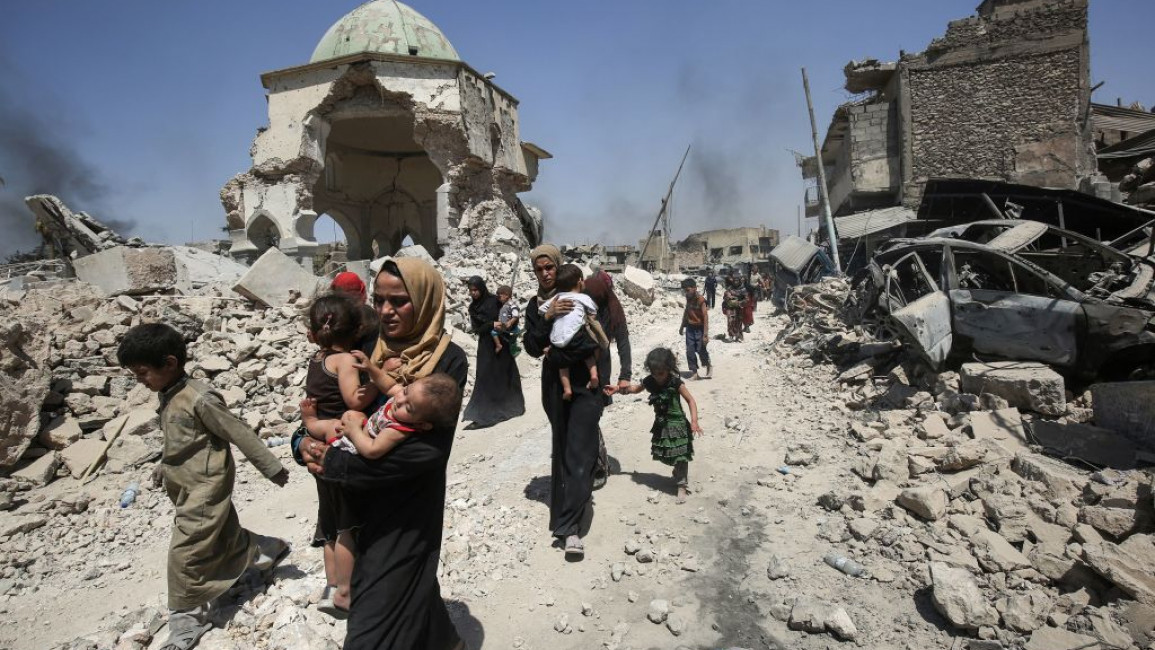
The Iraq Report: 10 years after the Islamic State's 'caliphate'

On 29 June 2014, the Islamic State (IS) declared a "caliphate" in Iraq and Syria, appointing Abu Bakr al-Baghdadi as their leader, a declaration deemed highly controversial and rejected by many Muslims.
At its height, the group controlled an area half the size of the United Kingdom and attracted tens of thousands of fighters from around the world.
Its rule was characterised by extreme violence; the beheading of civilians, journalists, and aid workers; the enslavement and rape of thousands of women from the Yazidi community; and the persecution of religious minorities.
In remembrance of those who suffered under the group's brutal reign, The New Arab (TNA) explores the legacy of this pivotal moment in Iraq's modern history.
'Caliphate'
Following the declaration of the "caliphate," IS killed, kidnapped, and threatened religious and ethnic minorities around Mosul in Northern Iraq.
After capturing the city on 10 June 2014, IS seized at least 200 Turkmen, Shabaks, and Yazidis, killing at least 11. In addition, IS ordered all Christians to convert to Islam, pay "tribute" money, or leave by 19 July.
According to their publication Dabiq, IS members ranked themselves at the top of the social hierarchy, followed by other Muslims, then Christians and Jews, with so-called 'non-believers' like the Yazidis at the bottom.
Away from the north, IS also persecuted Shia Muslims, predominantly in the south and particularly in Tikrit. In one of the largest massacres committed by the group, on 12 June 2014 over 1,500 unarmed Shia Iraqi Air Force cadets were executed in the Speicher Massacre.
The impact on Iraq's diverse communities
To understand the ongoing impact of IS rule on Iraqi communities, TNA interviewed researchers specialising in terrorism and political violence in the Middle East and North Africa region.
“The massacres IS committed against Shia cadets in Tikrit and against ethnic minority groups across Ninawa are among the most devastating events, and their impact continues today, altering the demography of these areas,” Hamzeh Hadad, Visiting Fellow at the European Council on Foreign Relations, told TNA.
Kawa Hassan, a Nonresident Fellow with Stimson's MENA program, pointed to the lasting trauma in Mosul, Sinjar, and other areas IS controlled. “The massacres, sexual slavery, destruction of culture and heritage, and killing of everyone who didn't agree with their politically totalitarian and deeply sectarian doctrine have deeply traumatised local communities.”
One of the darkest chapters in Iraq under IS rule was the persecution of the Yazidi community, with over 6,400 women and children sold into slavery after Sinjar was captured. A further 5,000 were murdered, in what a UN commission declared a genocide.
“The Yazidi genocide and other minorities targeted in Iraq, such as Christians, Turkmen, and Shabaks, are among the most profound and devastating legacies of IS," Joana Cook, Assistant Professor of Terrorism and Political Violence at Leiden University and Editor-in-Chief of the ICCT Journal of the International Center for Counterterrorism, told TNA.
“With 2,700 Yazidis still missing and many living in precarious situations in IDP camps in Iraq, their suffering continues without justice against their aggressors."
|
|
The Iraqis who lived under IS are still struggling today with destroyed or damaged infrastructure and the loss of livelihoods and family members, according to Cook.
“Families affiliated with IS fighters, largely women and children who had no role in the group, face precarious status in Iraq. This population, predominantly female-headed households, lacks legal documentation, education for the children, and faces deep stigmatisation," she said.
"Without durable solutions, the long-term outcomes, particularly for children, look very grim.”
Gina Vale, Lecturer of Criminology at the University of Southampton, added: “Daesh’s governance strategy aimed to fragment local communities in Iraq (and Syria), with impacts still deeply felt today.
“Some of the most devastating violations were perpetrated against Yazidi communities in Daesh’s campaign of genocide.
“Similarly, Sunni Muslim civilian women faced daily insecurity and threats of violence. The overwhelming majority of these instances go unrecognised, hampering reconciliation and denying meaningful justice.”
Ten years on, where does IS stand today?
IS' operations have significantly decreased since its 2017 defeat, shifting from a centralised network to decentralised, covert cells.
Coalition airstrikes on IS targets have reached their lowest levels since the coalition began, with combat operations stopping in December 2021.
Despite the military defeat of IS in Iraq and Syria and efforts to eliminate its leaders, the group has persisted.
IS cells remain active, especially in areas like Salahuddin, Anbar, Diyala, the Baghdad Belt, and the Jazira region. Moreover, fighters in prisons continue to support the organisation, and its activities vary across regions.
General Matthew W. McFarlane noted in August 2023 that IS' dangerous ideology still poses a potential threat.
On the opposite end of the spectrum, however, Iraqi officials believe that while IS is less of a threat than it was a decade ago, they do not see its resurgence as likely.
Moving forward: Commemoration and justice
Amid the uncertainty of IS' resurgence, there have been some important political interventions since the group's defeat to better support affected communities and prevent such atrocities from happening again.
But Hassan observes that while the security situation in Iraq has improved, the political process remains fragile. The defeat of IS provided an opportunity for substantive reforms and addressing the demands from the 2019 October uprising, yet these measures have not materialised.
Accountability for the fall of Mosul and Sinjar is notably absent, with government ministries increasingly functioning as personal fiefdoms and corruption remaining rampant.
The judiciary is weaponised to undermine political rivals, and despite efforts to enhance foreign relations, Iraq lacks a cohesive national vision, while militias such as the Popular Mobilisation Forces (PMF) or Hashd al-Shaabi, continue to hinder diplomatic progress.
|
|
Commenting on effective political intervention, Hadad tells TNA: “Iraq needs to take transitional justice more seriously. Unfortunately, it looks like we are sweeping the horrors of 2014 under the rug, as with previous atrocities, to not upset certain political factions. However, this means the pain will remain with the victims and could potentially cause future tension between communities.”
Cook also commented: “It is imperative that the victims of IS receive justice for the harms caused to them, and that durable solutions can be found for them to move forward in Iraq.
"This includes ensuring they receive the compensation promised to them and that areas heavily damaged during the conflict are rebuilt so they can return to their homes, communities, and livelihoods.
"Working towards post-conflict reconciliation between Iraqis also remains an important and under-developed ongoing area of work that complements targeted support to victims of IS.”
Cook also stressed the importance of education for children. “For the future prospects of these children, and indeed the next generation coming up in Iraq, it is imperative to focus on ensuring they can access education, that they are not stigmatised by their communities, or otherwise punished for the sins of their parents.
"Focusing on how to work towards a brighter, more united future for Iraq, particularly for its youngest generation, can be a legacy to counter that presented by IS.”
Vale, meanwhile, calls for greater inclusivity from the Iraqi government. “In order to be a collective endeavour, any commemoration must be inclusive and represent all communities affected by Daesh rule. This includes often overlooked or marginalised communities, including widows and orphans, LGBTQ+ persons, and the disabled.”
Eliminating the IS threat: Is it possible?
Today, some scholars argue that post-2003 corruption and economic instability were significant factors in IS’ emergence in Iraq.
Hadad asserts that tackling the IS threat in the region requires "genuine dialogue between various states and religious institutions," but acknowledges that this is challenging to achieve.
Hadad further suggests, "Iraq can focus on itself by addressing the root causes of violent extremism. If the Iraqi government provides good governance and enhances the standard of living, this will naturally reduce the factors driving IS".
Cook similarly states that combating sectarianism in the country is key. “IS is likely to never be fully eradicated – it’s almost impossible to eradicate an ideology. But important steps can be taken to prevent a resurgence by the group, such as ensuring sectarianism does not rise again in Iraq. Power vacuums, such as those that emerged from the Arab Spring in Syria, also facilitated IS, but such unexpected events are hard to predict or plan for.”
To achieve a lasting defeat of IS and prevent similar threats in the future, analysts say it is essential to address the underlying conditions that have enabled these groups to thrive.
Given the current climate of sectarian politics in Iraq, however, this looks increasingly difficult to achieve.
Besides persistent sectarianism in the country, recent reports indicate that the withdrawal of the remaining 2,500 US troops from Iraq, coupled with ongoing geopolitical turmoil in the region - particularly the Gaza war - could undermine regional stability and possibly encourage the resurgence of radical Islamist organisations.
The Iraq Report is a regular feature at The New Arab.
Click here to see the full archive.






 Follow the Middle East's top stories in English at The New Arab on Google News
Follow the Middle East's top stories in English at The New Arab on Google News


